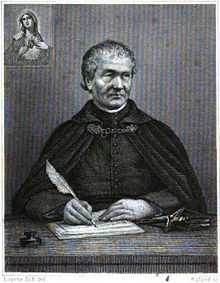Francis Libermann
| Ven. Francis Mary Paul Libermann | |
|---|---|
 An 1880 lithograph of Francis Libermann (the image in the upper left corner is of the Immaculate Heart of Mary) | |
| Born |
14 April 1804[1] in Saverne, Alsace |
| Died |
2 February 1852 (aged 49) in Paris, France |
| Venerated in | Roman Catholic Church |
| Feast | February 2 |
Francis Mary Paul Libermann (French: François-Marie-Paul Libermann; born Jacob Libermann; 14 April 1804 – 2 February 1852) was a 19th-century Jewish convert to Catholicism who was a member of the Spiritan order. He is best known for founding the Congregation of the Immaculate Heart of Mary which later merged with the Congregation of the Holy Ghost. He is often referred to as "The Second Founder of the Holy Ghost Fathers". He was declared venerable in the Roman Catholic Church on June 1, 1876, by Pope Pius IX.
Early life
Jacob Libermann was born into an Orthodox Jewish family in the ghetto of Saverne, Alsace, France in 1802. As a young man, Libermann prepared to follow in the footsteps of his father, the Chief Rabbi of Saverne. He would later relate how he lost his faith in Judaism after entering a yeshiva. Treated with disdain by two of the professors there, he began to read French literature, especially Rousseau, with the result that he became an agnostic. Later during this period of agnosticism, another rabbinical student gave him a Hebrew translation of the Gospels. Being always a very moral person, Libermann was captivated by the high moral tone of Jesus' discourses, though he could not accept the supernatural elements in the Gospels. Then, however, he received three blows to his agnosticism when two of his brothers, to whom he was very attached, and an old friend and former fellow student converted to Roman Catholicism. He, too, began to find himself drawn toward the Catholic Church. After arriving in Paris, where his father had sent him to pursue his studies, he made his decision and Jacob Libermann was baptized on December 24, 1826, taking the name François Marie Paul.[1] He entered a Paris seminary in the same year to study for the priesthood. The knowledge of his conversion was long concealed from his father, who was horrified to learn of his favorite son's actions. When the news of his baptism reached Saverne, his father mourned him as dead.
"That moment for me was one of extreme pain. My complete loneliness, the gloom of the cell with its one sky-light, the thought of being so far from my family, my country, all this plunged my heart into the deepest sadness and weighed down my heart with oppresive melancholy. Then it was that, remembering the God of my fathers, I cast myself on my knees and implored Him to enlighten me regarding the True Religion. I conjured him to make it known to me that the belief of Christians was true, if it was so; but if it was false, to remove me instantly far from it. The Lord, who is near to those who invoke him with their inmost soul, heard my prayer. I was at once enlightened; I saw the truth; faith penetrated my mind and heart. Setting myself to read Lhomond, I assented easily to all that it recounted of the life and death of Jesus Christ. Even the mystery of the Eucharist, though rather imprudently presented to my consideration, in no way repelled me. I believed all without difficulty. From that moment my greatest desire was to see myself plunged into the sacred Font; and my happiness was not long delayed. I was at once prepared for this admirable Sacrament, and received it on Christmas Eve. Next morning I was allowed to approach the Holy Table."— Francis Libermann, describing his conversion from Judaism to the Roman Catholic Church[2]:9
Priest and missionary
Libermann suffered from epileptic seizures, which prevented his ordination for nearly fifteen years. It was only when these seizures ceased in 1841 that he was able to become a priest. After his ordination, Libermann created the Congregation of the Immaculate Heart of Mary centered around missionary activity towards newly freed slaves in Réunion, Haiti, and Mauritius.[1]
As this group attracted more members, the Holy See merged his society with the older Congregation of the Holy Ghost, otherwise known as "Spiritans". Due to this event, Libermann is often referred to as the "Second Founder" of the Holy Ghost Fathers.
Although, Fr. Libermann himself never went overseas, he recruited and educated missionaries, both lay and clerical. He exhausted himself in the process of leading his great enterprise, and died on February 2, 1852 before his 50th birthday.[3]
Legacy
He was declared venerable by Pope Pius IX in 1876.
His letters, hundreds of which survive, are frequently used as a guide in the devotional life. Fr. Libermann was a pioneer of strategies now recognized as a blueprint for modern missionary activity. He urged the Spiritans to "become one with the people" so that each group received and understood the Gospel in the context of their own traditions.[3]
Francis Libermann Catholic High School in Toronto is named in his honor.
References
Bibliography
- Goepfert, Prosper (1880). The Life of the Venerable Francis Mary Paul Libermann. Dublin: M. H. Gill & Son.
- Burke, Christy (2010). No Longer Slaves: the mission of Francis Libermann (1802-1852). Dublin: Columba Press.
External links
- A newsletter about Fr. Libermann written by the Hebrew Catholic Association.
- Catholic Encyclopedia article
- The Life of Fr. Libermann as told in articles by the Holy Ghost Fathers.
| Catholic Church titles | ||
|---|---|---|
| Preceded by Alexandre Monnet |
Superior General of the Congregation of the Holy Ghost 1848 – 1852 |
Succeeded by Ignace Schwindenhammer |
|